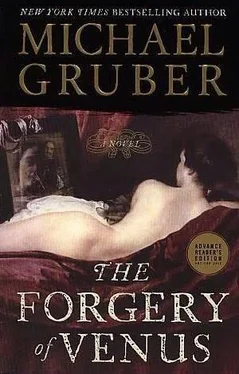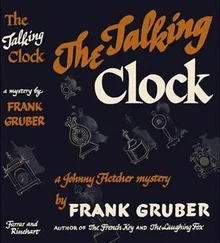He said, “I swear to God I didn’t know he was talking about a forgery. I never would have gotten you into this if-”
I stepped closer to him, put my arm around his shoulders, and grabbed his near arm.
“Let me interrupt you here, Mark,” I said, close to his ear. “I am angry. I’m a mild kind of guy, but like many mild guys, when I blow my top I’m out of control. I’m shaking from the adrenaline and I probably have the superhuman strength you read about, and so, my little man, if you don’t fucking level with me about Krebs and this whole deal, I am going to pick you up and throw you over the side of this vessel.”
And after a little struggle, out it came, because I really would have tossed him in the drink, and he knew it. I think it was the four-thousand-dollar suit and the five-hundred-dollar shoes more than the fear of actually drowning.
“Okay, here’s the whole thing,” he said. “First, what do you know about art theft?”
“Enough to know that ninety-five percent of it is bozos grabbing pictures off the wall and running out the door. Most museum security is a joke.”
“Exactly. But here I’m talking about the other five percent. I’m talking well-known paintings that can never be sold openly. Assuming they’re stolen by halfway smart thieves, what do they get out of it?”
“Ransom?”
“There’s that, but the fact is that when professional thieves lift major works of art, they want them for purposes of collateral. Criminal enterprises need to raise money the same as legitimate ones, and obviously they can’t go to legitimate sources of credit. A twenty-million-dollar painting is light, portable, easily hidden. I give you my painting, and you give me the five mil I need to buy heroin or armaments, and then when I’ve made my pile I pay you back plus your vig and you give me back my work of art. If the deal goes sour, you get to keep the painting. There are paintings we know of that’ve been used this way multiple times. It’s better than drugs or cash because there’s less possibility of pilferage, a little like commercial paper for bad guys.”
“I thought those boys worked by shooting people if they didn’t pay.”
“Oh, they do, they do, but that doesn’t do shit for their cash flow. With the artwork, they’re covered.”
“And where does our friend come into this?”
“I’ll tell you where. Think about it: at any one time there are a couple of dozen major works of art floating around the underworld, and these guys are not usually connoisseurs. They got no use for a Renoir. After the need for collateral is over, or if the party who has it in pawn needs some ready cash, what does he do? He’s got something worth twenty mil and he’s got no fucking idea in the world how to realize it. That’s what Krebs does.”
“He sells stolen artworks for criminals. Terrific. Who does he sell them to?”
“The people he was talking about. Rich fuckers who don’t give a damn.”
“And let me guess-you find the rich fuckers for him.”
“What’re you, nuts? I’m a legitimate dealer, I can’t be associated with the sale of stolen goods.”
“So what’s your end of the deal?”
“I’m a consultant.”
I laughed in his face.
“Seriously,” he said. “No kidding. He needs someone to talk to.”
“Who, Krebs? Mark, with all due respect, Krebs doesn’t need you to advise him about paintings.”
“No, but he does need a legitimate dealer to get him close to the museums. Not that the big houses are above handling dodgy stuff, but Krebs is poison. So when the time comes, it turns out that someone not to be named has offered Mark Slade Associates the stolen Renoir. Does the museum want it back? Of course they do, and so do the insurance companies who paid out. I arrange for the transfer and take a commission. The thief gets something, Krebs is insulated, the insurer cuts their loss, the picture’s back on the wall. Everyone is happy.”
“So you’re a front. A beard.”
“If you want to call it that. As far as the museum is concerned, I’m a hero. And this is all very discreet. I mean, you know me for years and you had no idea.”
“But I’m sort of not surprised. Where do the cops figure in all this?”
“What cops? Some of this isn’t even reported, and what is reported, well, most cops think there are better uses of their time, the guy who holds up liquor stores with a gun, drug gangs, rapists. They could care less, really, if some rich assholes lose a couple of paintings, especially if they get them back. They might get interested if an art theft led to a drug gang, or a big arms dealer, but if not, then not.”
“Not even about forgery?”
“What’re you talking forgery ? Forgery is I steal some checks and draw money from your account. Forgery is a fake will, Auntie Agatha’s money goes to the evil nephew and not the old cats’ shelter. There’s an injured party. Here, you’re producing a work of art indistinguishable from an original. Indistinguishable! Where’s the injury? The buyer looks at it and he’s full of exactly the same pride and pleasure as he would be if the work came from some guy who died three hundred years ago. And like Krebs said, how the hell do we know if anything is genuine? Because a so-called scholar who was getting paid by a dealer said so? The whole attribution thing is horseshit from beginning to end.”
“So we might as well get rich off the corruption.”
“Damn straight! Look, you probably don’t know any Wall Street types, bond traders, mergers and acquisitions guys, hedge fund managers, but I do. They’re my best customers. Chaz, believe me, these guys are assholes. They know nothing. When the market’s up they’re geniuses, and when the market’s down it’s not their fault, and they walk away with billions. These are people who run up a fifteen-thousand-dollar bar bill in an evening and they don’t even think about it. And you want me to be scrupulous about the authenticity of some painting I sell them?”
“It’s a point of view.”
“It’s the only one that makes sense, given the world as it is. Look, Chaz, I love painting. That’s something we have in common, me and Krebs. It’s not just commodities or bragging rights for us. It’s the only fucking genuine thing that’s left. And I love your work. You’re a wonderful artist, and over the years every time I’d see one of those things you’d done for some magazine, it’d stab me in the heart; I’d think, What a waste! And okay, you wouldn’t show your work, I don’t even want to ask why, but, honest to God, I always wanted to see you get out of that grungy world, busting your ass for three, four, five grand a pop, living in that shithole you’re in, never having any leisure, none of the respect your work deserves, and when this opportunity came up-”
“How did it come up?”
“Well, like he said, he’s a big fan.”
“That wasn’t bullshit?”
“No, and in fact that’s how I was able to get close to him. I met him at a party at Castelli’s. I’d sold him-I mean Castelli-a nice Correggio red chalk study of St. Mark, and I got introduced. This is like seven, eight years ago. Of course, I’d heard of Krebs, and we got to talking about painting, I mean contemporary stuff, and how we neither of us would hang on our own personal walls the work of anyone who couldn’t draw, and we talked about who could and couldn’t and he brought up your name. He’d seen that poster you did for the AIDS group, the Bosch? He thought it was amazing, and he was blown away when I told him you were like practically my best friend.”
“Former best friend.”
“Oh, come off it, Wilmot! I saw your eyes light up when he started talking about the money. Stop acting like a girl who just lost her cherry.”
Читать дальше












